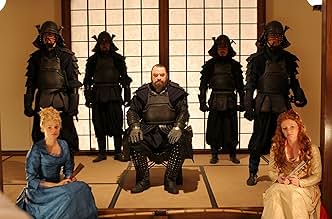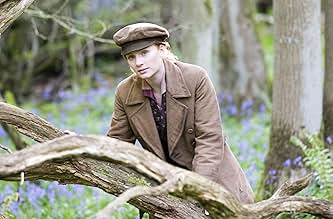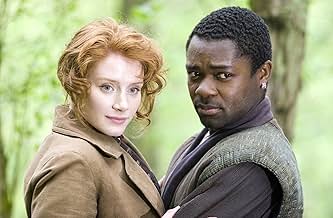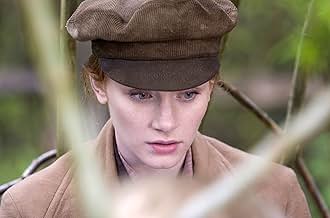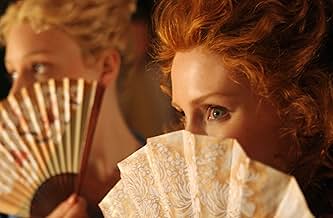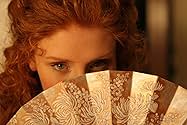PUNTUACIÓN EN IMDb
6,1/10
3,8 mil
TU PUNTUACIÓN
La hija del poderoso Duque debe demostrar su valentía e inventiva para estar con el hombre que ama.La hija del poderoso Duque debe demostrar su valentía e inventiva para estar con el hombre que ama.La hija del poderoso Duque debe demostrar su valentía e inventiva para estar con el hombre que ama.
- Premios
- 1 premio y 6 nominaciones en total
Nobuyuki Takano
- Charles
- (as Nobuyuki "Daishi" Takano)
Argumento
¿Sabías que...?
- CuriosidadesThis was the ninth and final film directed by Kenneth Branagh in which Richard Briers stars. The others are Enrique V (1989), Los amigos de Peter (1992), Swan Song (1992), Mucho ruido y pocas nueces (1993), Frankenstein de Mary Shelley (1994), En lo más crudo del crudo invierno (1995), Hamlet de Kenneth Branagh (1996) and Trabajos de amor perdidos (2000).
- PifiasLions are not native to Japan. The lion is a carryover from the original play, which was set in a generic European country at an indeterminate time in the Middle Ages. Even that didn't make much sense, as lions have been extirpated from the main part of Europe since the 4th century AD, and from the Caucasus since the 10th century. But many Europeans, possibly including William Shakespeare, didn't know that lions weren't around anymore.
- Citas
Touchstone: The fool doth think he is wise, but the wise man knows himself to be a fool.
- Créditos adicionalesThe picture seems to end without the play's Epilogue. Then, the closing credits begin, when they are suddenly interrupted by Bryce Dallas Howard, still in character as Rosalind, who then is seen speaking the Epilogue as she begins to walk to her trailer, drinking a cup of coffee along the way. After the speech, Kenneth Branagh can be heard off-screen saying "Aaaand...cut!" After this, the closing credits resume.
- Versiones alternativasThe version shown on cable television has been formatted to the aspect ratio commonly used in HDTV production (that is, anywhere from 1.78:1 to 1.85:1), while the version released to movie theatres was released in the typical CinemaScope/Panavision aspect ratio (2.39:1). It is the theatrical version which has been issued on DVD. Since the film was made using the Super 35 format, it was possible to make versions of the film in different aspect ratios.
- ConexionesFeatured in 14th Annual Screen Actors Guild Awards (2008)
- Banda sonoraUnder the Greenwood Tree
Composed by Patrick Doyle
Lyrics by William Shakespeare
Performed by Patrick Doyle and London Symphony Orchestra
Reseña destacada
Here's one of the most intriguing challenges in all the lands of imagination.
Shakespeare invented much of what it means to be a modern human. But he did so in a very constrained way of communicating. The plays were all about language and geometry on how the come to us, and within that vessel he grew images. That sparseness was what allowed him to shape the language so finely, thus creating the poetic spins that find valence in us.
Okay. If you have seen Shakespeare done as it originally was, you'll know what I mean. The plays work well when read silently or aloud as well. But how to translate to cinema? How to take something that is not visual until it enters us, and make it visual before it enters us and make the same magic?
I love how people have tried. Most modern stage productions follow this cinematic challenge as well because now we are a visual society.
Jarman, Greenaway, Luhrman and Taymor have done marvelous things with this challenge. Branaugh is from a different stripe, a sideways approach to this problem. He sometimes moves into pure cinema (Kate's mirrored Ophelia rant, the horses in "Much Ado") but he's primarily worried about stagecraft as theatrically defined. Here he does something different, something so ambitious I'm trilled to be alive for it. Its so clever.
I did not see this at an appointed time, but stumbled on it after a discouraging day. In a sense, it saved my life. It really did. I watched the whole thing with one of those openmouthed grins.
Here's what he did. He transported the setting to Japan and adjusted everything accordingly. Simple idea.
No, its not just Shakespeare with different clothes. Its not just the plot fleshed out with some other setting. Its a translation to a visual expression. Japan has spent a few hundred years building, refining and constraining a visual grammar in much the same way that Northern Europeans did with language. We lose much of what we associate with the plays, that verbal poetry. What we get in its stead is something similar but visually rooted. To establish this of course you have to "show strong" in the beginning, and he does with a completely wordless intrusion, an invasion of guess what? A play!
This Rosalind is exquisite, someone who knows how to shape the space around her the way British actors carefully shape their words. She anchors the whole thing, including an amazing epilogue. Really, you should save this for when you need your life saved, when you need to stroke down melancholy burrs.
Though Branaugh ends with his familiar happydance, by then you will be ready for it, ready to fall in love all over again.
Ted's Evaluation -- 3 of 3: Worth watching.
Shakespeare invented much of what it means to be a modern human. But he did so in a very constrained way of communicating. The plays were all about language and geometry on how the come to us, and within that vessel he grew images. That sparseness was what allowed him to shape the language so finely, thus creating the poetic spins that find valence in us.
Okay. If you have seen Shakespeare done as it originally was, you'll know what I mean. The plays work well when read silently or aloud as well. But how to translate to cinema? How to take something that is not visual until it enters us, and make it visual before it enters us and make the same magic?
I love how people have tried. Most modern stage productions follow this cinematic challenge as well because now we are a visual society.
Jarman, Greenaway, Luhrman and Taymor have done marvelous things with this challenge. Branaugh is from a different stripe, a sideways approach to this problem. He sometimes moves into pure cinema (Kate's mirrored Ophelia rant, the horses in "Much Ado") but he's primarily worried about stagecraft as theatrically defined. Here he does something different, something so ambitious I'm trilled to be alive for it. Its so clever.
I did not see this at an appointed time, but stumbled on it after a discouraging day. In a sense, it saved my life. It really did. I watched the whole thing with one of those openmouthed grins.
Here's what he did. He transported the setting to Japan and adjusted everything accordingly. Simple idea.
No, its not just Shakespeare with different clothes. Its not just the plot fleshed out with some other setting. Its a translation to a visual expression. Japan has spent a few hundred years building, refining and constraining a visual grammar in much the same way that Northern Europeans did with language. We lose much of what we associate with the plays, that verbal poetry. What we get in its stead is something similar but visually rooted. To establish this of course you have to "show strong" in the beginning, and he does with a completely wordless intrusion, an invasion of guess what? A play!
This Rosalind is exquisite, someone who knows how to shape the space around her the way British actors carefully shape their words. She anchors the whole thing, including an amazing epilogue. Really, you should save this for when you need your life saved, when you need to stroke down melancholy burrs.
Though Branaugh ends with his familiar happydance, by then you will be ready for it, ready to fall in love all over again.
Ted's Evaluation -- 3 of 3: Worth watching.
- tedg
- 19 feb 2009
- Enlace permanente
Selecciones populares
Inicia sesión para calificar y añadir a tu lista para recibir recomendaciones personalizadas
- How long is As You Like It?Con tecnología de Alexa
Detalles
- Fecha de lanzamiento
- Países de origen
- Idioma
- Títulos en diferentes países
- As You Like It
- Localizaciones del rodaje
- Empresas productoras
- Ver más compañías en los créditos en IMDbPro
Taquilla
- Recaudación en todo el mundo
- 563.162 US$
- Duración2 horas 7 minutos
- Color
- Mezcla de sonido
Contribuir a esta página
Sugerir un cambio o añadir el contenido que falta

Principal laguna de datos
By what name was Como gustéis (2006) officially released in India in English?
Responde



